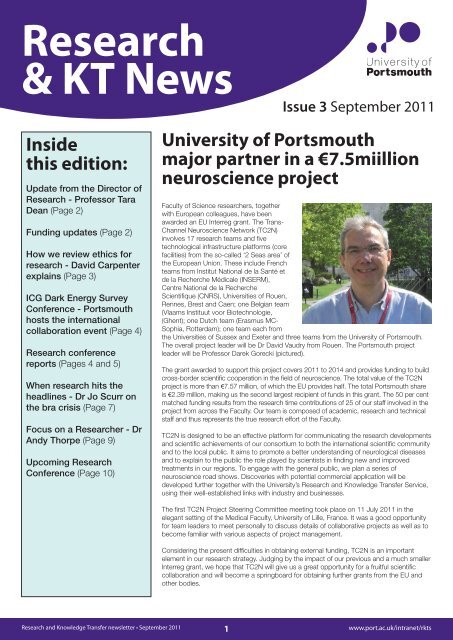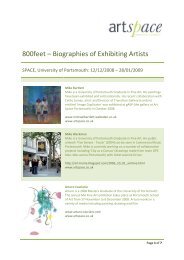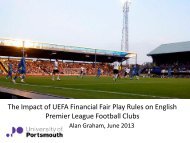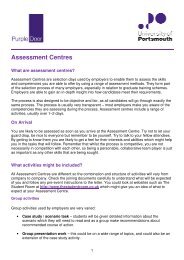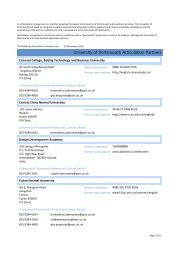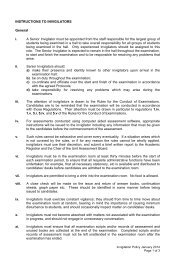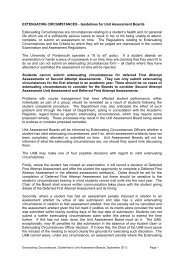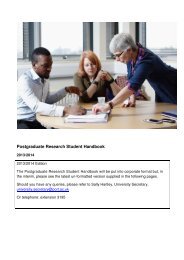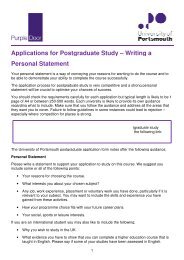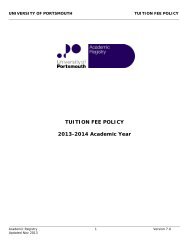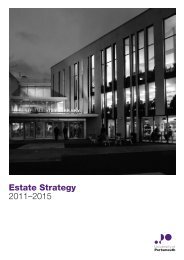September 2011 - University of Portsmouth
September 2011 - University of Portsmouth
September 2011 - University of Portsmouth
Create successful ePaper yourself
Turn your PDF publications into a flip-book with our unique Google optimized e-Paper software.
Research<br />
& KT News<br />
Issue 3 <strong>September</strong> <strong>2011</strong><br />
Inside<br />
this edition:<br />
Update from the Director <strong>of</strong><br />
Research - Pr<strong>of</strong>essor Tara<br />
Dean (Page 2)<br />
Funding updates (Page 2)<br />
How we review ethics for<br />
research - David Carpenter<br />
explains (Page 3)<br />
ICG Dark Energy Survey<br />
Conference - <strong>Portsmouth</strong><br />
hosts the international<br />
collaboration event (Page 4)<br />
Research conference<br />
reports (Pages 4 and 5)<br />
When research hits the<br />
headlines - Dr Jo Scurr on<br />
the bra crisis (Page 7)<br />
Focus on a Researcher - Dr<br />
Andy Thorpe (Page 9)<br />
Upcoming Research<br />
Conference (Page 10)<br />
<strong>University</strong> <strong>of</strong> <strong>Portsmouth</strong><br />
major partner in a €7.5miillion<br />
neuroscience project<br />
Faculty <strong>of</strong> Science researchers, together<br />
with European colleagues, have been<br />
awarded an EU Interreg grant. The Trans-<br />
Channel Neuroscience Network (TC2N)<br />
involves 17 research teams and five<br />
technological infrastructure platforms (core<br />
facilities) from the so-called ‘2 Seas area’ <strong>of</strong><br />
the European Union. These include French<br />
teams from Institut National de la Santé et<br />
de la Recherche Médicale (INSERM),<br />
Centre National de la Recherche<br />
Scientifique (CNRS), Universities <strong>of</strong> Rouen,<br />
Rennes, Brest and Caen; one Belgian team<br />
(Vlaams Instituut voor Biotechnologie,<br />
(Ghent); one Dutch team (Erasmus MC-<br />
Sophia, Rotterdam); one team each from<br />
the Universities <strong>of</strong> Sussex and Exeter and three teams from the <strong>University</strong> <strong>of</strong> <strong>Portsmouth</strong>.<br />
The overall project leader will be Dr David Vaudry from Rouen. The <strong>Portsmouth</strong> project<br />
leader will be Pr<strong>of</strong>essor Darek Gorecki (pictured).<br />
The grant awarded to support this project covers <strong>2011</strong> to 2014 and provides funding to build<br />
cross-border scientific cooperation in the field <strong>of</strong> neuroscience. The total value <strong>of</strong> the TC2N<br />
project is more than €7.57 million, <strong>of</strong> which the EU provides half. The total <strong>Portsmouth</strong> share<br />
is €2.39 million, making us the second largest recipient <strong>of</strong> funds in this grant. The 50 per cent<br />
matched funding results from the research time contributions <strong>of</strong> 25 <strong>of</strong> our staff involved in the<br />
project from across the Faculty. Our team is composed <strong>of</strong> academic, research and technical<br />
staff and thus represents the true research effort <strong>of</strong> the Faculty.<br />
TC2N is designed to be an effective platform for communicating the research developments<br />
and scientific achievements <strong>of</strong> our consortium to both the international scientific community<br />
and to the local public. It aims to promote a better understanding <strong>of</strong> neurological diseases<br />
and to explain to the public the role played by scientists in finding new and improved<br />
treatments in our regions. To engage with the general public, we plan a series <strong>of</strong><br />
neuroscience road shows. Discoveries with potential commercial application will be<br />
developed further together with the <strong>University</strong>’s Research and Knowledge Transfer Service,<br />
using their well-established links with industry and businesses.<br />
The first TC2N Project Steering Committee meeting took place on 11 July <strong>2011</strong> in the<br />
elegant setting <strong>of</strong> the Medical Faculty, <strong>University</strong> <strong>of</strong> Lille, France. It was a good opportunity<br />
for team leaders to meet personally to discuss details <strong>of</strong> collaborative projects as well as to<br />
become familiar with various aspects <strong>of</strong> project management.<br />
Considering the present difficulties in obtaining external funding, TC2N is an important<br />
element in our research strategy. Judging by the impact <strong>of</strong> our previous and a much smaller<br />
Interreg grant, we hope that TC2N will give us a great opportunity for a fruitful scientific<br />
collaboration and will become a springboard for obtaining further grants from the EU and<br />
other bodies.<br />
Research and Knowledge Transfer newsletter • <strong>September</strong> <strong>2011</strong><br />
1<br />
www.port.ac.uk/intranet/rkts
Update from the Director <strong>of</strong> Research -<br />
Pr<strong>of</strong>essor Tara Dean<br />
Welcome to the third edition <strong>of</strong> Research & KT News. The new academic year is well underway and<br />
the summer break is a distant memory.<br />
There will be busy and testing times ahead. The Research<br />
Excellence Framework (REF) is fast approaching and we are<br />
compiling our response on the draft panel criteria and the<br />
working methods consultation. Putting the REF aside, in my<br />
opinion there are two constants in research – to be quality and<br />
to be agenda-setting. Whatever sort <strong>of</strong> research you are<br />
carrying out, if the basic quality is high, then money, PhD<br />
students, recognition in your field, REF success, career<br />
aspirations and everything else that is desirable, can follow.<br />
Who is listening to us and who are we influencing with our<br />
research? We want our research to be played out not just on a<br />
local stage, but to set the agenda for the discipline. Most<br />
research is a global business and we must respond to that.<br />
When I started my career, research was a rather personal<br />
occupation and it wasn’t really the done thing to shout about<br />
one’s successes. That’s all changed now, and one <strong>of</strong> my key<br />
tasks will be to tell as wide an audience as possible about all<br />
the great research success stories at <strong>Portsmouth</strong>.<br />
Just looking at some <strong>of</strong> the events which have taken place<br />
since June (page four) demonstrates that we are on a steep<br />
upward trajectory in celebrating our success. Early in<br />
January 2012 we will hold a Research Conference (page ten)<br />
with some recognised national figures in research. I hope we<br />
can demonstrate to them and to colleagues from other<br />
universities the excellent impact <strong>of</strong> the research at the <strong>University</strong><br />
<strong>of</strong> <strong>Portsmouth</strong>.<br />
This academic year will be a busy year for all <strong>of</strong> us. We need to<br />
prepare for the REF. We will need to set the agenda for the<br />
future <strong>of</strong> our new Research Strategy (2012-2017). We need to<br />
put procedures in place to ensure that submitted research<br />
funding applications are <strong>of</strong> a high enough quality to make them<br />
competitive against others. We need to ensure our contract<br />
research staff are supported and that we are fully on board with<br />
the principles <strong>of</strong> the Research Councils UK concordat. We need<br />
to think <strong>of</strong> innovative strategies to grow our postgraduate<br />
student numbers. We need to increase our external and internal<br />
visibility on the <strong>University</strong> website...<br />
Lots to do but, as they say be not afraid <strong>of</strong> growing slowly,<br />
be afraid only <strong>of</strong> standing still.<br />
Funding update<br />
Awards since June <strong>2011</strong><br />
Faculty <strong>of</strong> Creative<br />
and Cultural Industries<br />
Dan Pinchbeck<br />
thechineseroom: Commercialisation <strong>of</strong><br />
Practice-led, Research Driven<br />
Experimental Storytelling in Games.<br />
Arts and Humanities Research Council<br />
- £95,821.<br />
<strong>Portsmouth</strong> Business School<br />
Lisa Jack<br />
Improving Performance Measurement<br />
and Managing Risk in Intermediary Food<br />
Chain Businesses.<br />
Chartered Institute <strong>of</strong> Management<br />
Accountants - £7,519.<br />
Faculty <strong>of</strong> Science<br />
Andy Gibson<br />
Zhouqu, China Disaster Data Capturing<br />
Modelling and Preliminary Assessment.<br />
Natural Environment Research Council<br />
- £14,554.<br />
Ge<strong>of</strong>f Pilkington<br />
Compound Testing as part <strong>of</strong> a FASILIS<br />
Voucher Project.<br />
Synovo GmbH - £4,615.<br />
David Loydell<br />
Biostratigraphy <strong>of</strong> Hot Shales in<br />
Morocco.<br />
EOG Resources UK Limited - £12,500.<br />
Susanne Dietrich<br />
Characterization <strong>of</strong> a Potential Novel<br />
Biomarker for Muscle Stem Cells.<br />
Association Française Contre Les<br />
Myopathies Spcs - £27,872.<br />
Eric May<br />
SEM Running Contribution.<br />
<strong>University</strong> <strong>of</strong> Warwick - £27,872.<br />
Darek Gorecki<br />
EU Interreg Grant<br />
TC2N - £7.5M.<br />
Principal<br />
Investigator<br />
Development<br />
Programme<br />
The <strong>University</strong> has announced a new<br />
Principal Investigator Development<br />
Programme (PIDP). Initial details are below.<br />
If you would like to be considered for any <strong>of</strong><br />
the sessions below, please email<br />
rkts@port.ac.uk.<br />
Research Excellence Framework 2014<br />
19 October <strong>2011</strong>, 12.00-14.00<br />
Pathways to Impact<br />
21 December <strong>2011</strong>, 12.00-14.00<br />
Fit to bid<br />
22 February 2012, 13.00-15.00<br />
Concordat Overview<br />
18 April 2012, 12.00-14.00<br />
Research Ethics<br />
20 June 2012, 12.00-14.00<br />
Research and Knowledge Transfer newsletter • <strong>September</strong> <strong>2011</strong><br />
2<br />
www.port.ac.uk/intranet/rkts
How we review ethics for research<br />
The very mention <strong>of</strong> research ethics, in the past, could be guaranteed to elicit a groan and accusations<br />
<strong>of</strong> constraints upon academic freedom and needless bureaucracy. Today, ethical review is fairly well<br />
normalised and plays a key role in funding applications and securing publication. The <strong>University</strong> has<br />
endeavoured to minimise bureaucratic demands and, in some cases, ethical review results in<br />
methodological improvement and design enhancement.<br />
Basic advice can be found in the <strong>University</strong> Ethics Policy which<br />
includes a substantial section on the topic <strong>of</strong> research ethics.<br />
Proportionality is the key concern; all research involving or<br />
impacting upon human subjects (for example, environmental<br />
research) must be reviewed, but many reviews will be light touch.<br />
The Economic Social Research Council (ESRC)’s Framework for<br />
Ethics Research (FRE) provides helpful examples <strong>of</strong> studies only<br />
requiring minimal review. There are some minor variations across<br />
the <strong>University</strong>, but as a general rule it is staff research and student<br />
research - above taught postgraduate level - that is reviewed by a<br />
full committee. The review <strong>of</strong> undergraduate research is usually a<br />
matter <strong>of</strong> discussion between supervisor and student, aided by a<br />
checklist <strong>of</strong> typical concerns. Again, the FRE includes an excellent<br />
example <strong>of</strong> a checklist.<br />
burdensome research can still be ethical; it is equally possible that<br />
research involving few risks and burdens can be unethical. I sense a<br />
gradual shift in attitudes. For far too long researchers have been<br />
defending their studies and justifying human involvement. Surely it<br />
can be argued that there is a moral imperative to undertake<br />
worthwhile research. I have seen plenty <strong>of</strong> examples <strong>of</strong> studies<br />
where it would be unethical if they were not undertaken. The very<br />
best research might benefit humanity and researchers have a duty<br />
to conduct it rather than apologise to a REC.<br />
David Carpenter – <strong>University</strong> Research Ethics Adviser<br />
Each faculty has an ethics committee and the Faculty <strong>of</strong> Science<br />
has some at departmental level. These committees have remits<br />
which extend beyond research to wider ethical issues, and all report<br />
to the <strong>University</strong> Ethics Committee. Some research is reviewed<br />
externally; the most common example is NHS research. As a matter<br />
<strong>of</strong> national policy, all research involving patients and their relatives or<br />
non-pr<strong>of</strong>essional carers must be reviewed by a NHS Research<br />
Ethics Committee (REC). NHS RECs are also constituted to<br />
undertake reviews required by statute; this includes research<br />
involving mentally incapacitated adults and research involving<br />
human tissue. The <strong>University</strong> adopts a policy <strong>of</strong> single review so the<br />
final opinions <strong>of</strong> NHS REC reviews are logged and no further review<br />
is undertaken.<br />
It is worth noting some important linguistic points. Study protocols<br />
are submitted to a REC for review not approval and RECs give<br />
opinions rather than approvals. Approval can be very misleading.<br />
A REC can, at best, provide a favourable opinion; this means that it<br />
has concluded that if the research is conducted according to the<br />
protocol it will be ethical. Approval implies that the REC has<br />
authorised the research to proceed; RECs do not have such<br />
powers, this is a matter <strong>of</strong> governance. Any organisation might<br />
have perfectly legitimate reasons for refusing to host research<br />
that has been given a favourable opinion. Obviously RECs can also<br />
give unfavourable opinions and, most commonly, conditional<br />
favourable opinions.<br />
The main concern <strong>of</strong> a REC is to ensure that full consideration has<br />
been given to the welfare <strong>of</strong> participants. To over-simplify the<br />
matter, the REC must be assured that participants will be fully<br />
informed <strong>of</strong> any risks and that their participation will be entirely<br />
voluntary. Further advice and guidance on issues such as<br />
information and consent will be available on the <strong>University</strong> Research<br />
and Knowledge Transfer website soon. It is not part <strong>of</strong> the remit <strong>of</strong> a<br />
REC to evaluate methodology and design, however it is obvious<br />
that poor research will be unethical; if no worthwhile outcomes are<br />
likely then participants’ time will have been wasted and risks might<br />
have been taken unnecessarily. Most RECs look for a sensible<br />
balance between the value <strong>of</strong> the study and the burdens and risks<br />
involved for participants. It is entirely possible that high risk,<br />
Research and Knowledge Transfer newsletter • <strong>September</strong> <strong>2011</strong><br />
3<br />
www.port.ac.uk/intranet/rkts
ESRC Seminar Series -<br />
Post-transitional<br />
fertility in developing<br />
countries: cause and<br />
implications<br />
20-21 July <strong>2011</strong><br />
The Global Health and Social Care Unit, in the School <strong>of</strong> Health<br />
Sciences and Social Work, has been successful in obtaining funding<br />
from the Economic Social Research Council (ESRC) to lead three<br />
seminars on post-transitional fertility in developing countries. The first<br />
in the series was organised at the <strong>University</strong> <strong>of</strong> <strong>Portsmouth</strong>. It was<br />
coordinated by Dr Saseendran Pallikdavath, <strong>University</strong> <strong>of</strong><br />
<strong>Portsmouth</strong>; Dr Chris Wilson, <strong>University</strong> <strong>of</strong> St Andrews and Pr<strong>of</strong>essor<br />
Irudaya Rajan, Centre for Development Studies, India. This seminar<br />
was attended by over 30 researchers from UK, India, USA, Vienna,<br />
Hong Kong, Israel, Italy, Bangladesh, and Germany. The objective <strong>of</strong><br />
the seminar was to discuss causes and consequences <strong>of</strong> below<br />
replacement level fertility in developing countries.<br />
Some <strong>of</strong> the eminent demographers from the UK and Europe<br />
delivered lectures on the topic. These included Pr<strong>of</strong>essor Tim<br />
Dyson, London School <strong>of</strong> Economics; Pr<strong>of</strong>essor John Cleland,<br />
London School <strong>of</strong> Hygiene and Tropical Medicine; Pr<strong>of</strong>essor David<br />
Reher, Universidad Complutense, Madrid; Pr<strong>of</strong>essor Jane<br />
Falkingham, <strong>University</strong> <strong>of</strong> Southampton; Peter Richerson <strong>University</strong><br />
<strong>of</strong> California Davis; and Dr Thomas Sobotka, Vienna Institute <strong>of</strong><br />
Demography, Austrian Academy <strong>of</strong> Sciences.<br />
Participants at the ESRC Seminar Series, 20-21 July.<br />
The speakers and organisers provided various perspectives on<br />
post-transitional fertility in developing and developed country<br />
contexts and highlighted that the developing world is fast<br />
approaching below replacement level fertility and that some <strong>of</strong> the<br />
consequences <strong>of</strong> low fertility experienced in the developed world<br />
cannot be ignored in the developing world. The second day was<br />
devoted to examining specific issues on low fertility in developing<br />
countries and focused on specific country contexts such as<br />
Bangladesh and Israel. These presentations were followed by<br />
discussions and identification <strong>of</strong> research questions and strategies.<br />
The seminar identified gaps in knowledge in this field and outlined<br />
questions for future research. Participants expressed interest in<br />
working in collaborative teams to develop research grant applications<br />
on these issues. The <strong>University</strong> will coordinate such efforts. A<br />
network <strong>of</strong> participants is already established to continue discussions<br />
on this topic.<br />
The next seminar series will be at the Centre for Development<br />
Studies, Trivandrum, India during July 2012. This will focus on low<br />
fertility in South Asia region and will be a major event. The last and<br />
final seminar will be held at the <strong>University</strong> <strong>of</strong> St Andrews during 2013.<br />
UK Cosmo<br />
Conference<br />
12-14 <strong>September</strong> <strong>2011</strong><br />
The Institute <strong>of</strong> Cosmology and<br />
Gravitation (ICG) hosted<br />
conferences focusing on the more<br />
theoretical aspects <strong>of</strong> cosmology.<br />
The national UK Cosmo meeting<br />
brought to town cosmologists from the UK and abroad,<br />
including delegations from Japan and South Africa.<br />
The initial meeting involved 80 people and lasted three<br />
days, covering various topics relating to the physics <strong>of</strong> the<br />
early universe, such as models <strong>of</strong> inflation and cosmic<br />
strings. This was followed by smaller workshops that ran<br />
until the end <strong>of</strong> <strong>September</strong>, to allow more time for discussion<br />
and collaboration.<br />
ICG Dark Energy<br />
Survey Conference<br />
26 June-1 July <strong>2011</strong><br />
The Institute for Cosmology and Gravitation (ICG) hosted<br />
an international collaboration meeting for the Dark Energy<br />
Survey (DES). The meeting was attended by more than<br />
120 astronomers from the 23 DES member institutes,<br />
located in the United States, Brazil, Spain, Germany, and the<br />
United Kingdom.<br />
The Dark Energy<br />
Survey is designed to<br />
help uncover the<br />
nature <strong>of</strong> the<br />
mysterious ‘dark<br />
energy’ which gives<br />
rise to a repulsive<br />
gravitational force and is causing the expansion rate <strong>of</strong> the<br />
universe to accelerate. The collaboration is building a new<br />
optical instrument and large digital camera that will be<br />
mounted on the Blanco Four-meter telescope at the Cerro<br />
Tololo Inter-American Observatory, high in the Chilean<br />
Andes. Once complete next year, the collaboration will<br />
spend five years surveying the southern sky.<br />
As one <strong>of</strong> the first collaboration members, ICG has played a<br />
key role in the development <strong>of</strong> the survey, helping to purchase<br />
the glass from which the new lenses were made. ICG<br />
members play leading roles in the groups working to exploit<br />
the science results that will be coming from the survey.<br />
While in <strong>Portsmouth</strong>, collaboration members were hard at<br />
work making plans for analysing the tremendous amount <strong>of</strong><br />
data that the survey will provide. However, they did have<br />
time to enjoy our cream tea, an atypical stretch <strong>of</strong> good<br />
weather, and a banquet held aboard the HMS Warrior.<br />
Research and Knowledge Transfer newsletter • <strong>September</strong> <strong>2011</strong><br />
4<br />
www.port.ac.uk/intranet/rkts
<strong>Portsmouth</strong> Business<br />
School Research and<br />
Knowledge Transfer<br />
Conference 7 June <strong>2011</strong><br />
This successful conference was an ideal opportunity to communicate<br />
the Business School’s research and knowledge transfer activities and<br />
was an excellent way to promote the School, both internally and<br />
externally, as a strong and research-active unit. The day was opened<br />
by Pro Vice-Chancellor, Dr David Arrell, followed by a full programme<br />
<strong>of</strong> 42 presentations and discussions from research and knowledge<br />
transfer active members <strong>of</strong> staff, allowing participants (who were a<br />
mixture <strong>of</strong> <strong>University</strong> staff and those from local business) an<br />
opportunity to find out about the many varied projects in which the<br />
Business School is involved.<br />
This year, we introduced special streams on the Principle <strong>of</strong><br />
Response in Management Education (PRIME) and Responsible<br />
Capitalism and Sustainable Business, plus a plenary session entitled<br />
Make our Knowledge Your Business - Our customers’ view on how<br />
working with the <strong>University</strong> improved their bottom line, which<br />
included presentations from Mr Rik Prowen, Operations Director, JS<br />
Humidifiers, West Sussex and Mr Michael Lawther, Strategic Director,<br />
City Solicitor, <strong>Portsmouth</strong> City Council.<br />
During lunch the winners <strong>of</strong> the Neil Rackham research prizes were<br />
announced as follows:<br />
Winners <strong>of</strong> the Neil Rackham research prizes.<br />
Research excellence prize £10,000<br />
Dr. Alessio Ishizaka, Senior Lecturer in the Department <strong>of</strong> Strategy<br />
and Business Systems, for the paper Does Analytical Hierarchy<br />
Process (AHP) help us make a choice? An experimental evaluation,<br />
Journal <strong>of</strong> the Operational Research Society, 1–12, 2010<br />
(co-authors: D. Balkenborg, and T. Kaplan).<br />
Dissemination <strong>of</strong> research prize £5,000<br />
Joe Cox, Senior Lecturer in the Department <strong>of</strong> Economics, for the<br />
paper entitled Seeders, leechers and social norms: Evidence from the<br />
market for illicit digital downloading, Information Economics and Policy,<br />
22, 299–305, 2010 (co-authors: A. Collins, and S. Drinkwater).<br />
<strong>2011</strong> Technology<br />
Research Day<br />
8 June <strong>2011</strong><br />
The fifth Annual Technology Research Day was held to<br />
celebrate the achievements <strong>of</strong> the Faculty <strong>of</strong> Technology and<br />
to promote cross-departmental collaboration. The morning<br />
started with a welcome from the Dean - Pr<strong>of</strong>essor Djamel<br />
Ait-Boudaoud – followed by the first <strong>of</strong> the newly-established<br />
tradition <strong>of</strong> a keynote faculty address from newly-appointed<br />
Readers and Pr<strong>of</strong>essors. Pr<strong>of</strong>essor Will Percival from Institute<br />
<strong>of</strong> Cosmology and Gravitation (ICG) was the first in the hot<br />
seat to explain Mapping the Universe to an audience <strong>of</strong> over<br />
100 technically-literate faculty members, some <strong>of</strong> whom were<br />
remembering undergraduate physics to follow the latter<br />
stages <strong>of</strong> his well-paced address. The morning session also<br />
had updates on Research Excellence Framework<br />
preparations (from the Director <strong>of</strong> Research, Pr<strong>of</strong>essor Tara<br />
Dean), The Graduate School (from Director, Dr Darren Van<br />
Laar) and The <strong>University</strong> Library (from Mr Timothy Collinson<br />
and Mr Andy Barrow – the Faculty Librarian and Institutional<br />
Repository Coordinator respectively).<br />
Over lunch, a PhD student poster competition was judged<br />
by an anonymous Research and Knowledge Transfer staff<br />
member. The winner <strong>of</strong> the £100 book token was Felix<br />
Hellwig from the Department <strong>of</strong> Mechanical and Design<br />
Engineering (MDE), for his computer-aided studies <strong>of</strong><br />
femoral acebular impingement. The two runners-up<br />
receiving £50 book tokens were James MacMullen, also<br />
from MDE, for his study <strong>of</strong> hydroxil functionalised poly<br />
di-methylsiloxane and its incorporation into exterior facade<br />
emulsion treatments, and Rafal Szepietowski, from ICG, for<br />
his study <strong>of</strong> how to map dark matter and Bayesian weak<br />
lens reconstruction.<br />
The afternoon followed a new structure with three parallel<br />
strands, designed to draw together themes across<br />
departmental boundaries. This included presentations<br />
covering materials, environmental technology and the<br />
interface <strong>of</strong> cosmology with computing. All departments<br />
were well represented and we were especially grateful for<br />
Pr<strong>of</strong>essor Arthur Butt from the Institute <strong>of</strong> Biomedical and<br />
Biomolecular Science for breaking Faculty boundaries with a<br />
talk on the similarity <strong>of</strong> the computing challenges on the<br />
molecular and cosmological scale.<br />
At the end <strong>of</strong> what was considered a useful day, everyone<br />
retired to the Hub for canapés, prize giving and drinks.<br />
Climate Change Conference 15 <strong>September</strong> <strong>2011</strong><br />
Industry leaders, local councils, county councils, trusts and interested parties convened in the <strong>University</strong>’s Portland Building to show their<br />
commitment to the climate change agenda.<br />
This inaugural meeting was spearheaded by the <strong>University</strong>’s Environment Network (UPEN).<br />
With over 140 people in attendance from the academic sector, industry and support services,<br />
the conference was a great success as it highlighted the ability <strong>of</strong> local organisations working<br />
in partnership to develop ideas to help reduce the impact <strong>of</strong> climate change in the region.<br />
More than 75 businesses engaged in the conference. Members will now focus on taking<br />
forward the ideas tabled at the conference and developing effective proposals. If you would<br />
like to be involved please email david.hutchinson@port.ac.uk.<br />
Delegates <strong>of</strong> the Climate Change Conference.<br />
Research and Knowledge Transfer newsletter • <strong>September</strong> <strong>2011</strong><br />
5<br />
www.port.ac.uk/intranet/rkts
Featured website - REF 2014<br />
www.hefce.ac.uk/research/ref<br />
HEFCE’s Research Excellence Framework (REF) website is the<br />
essential guide to all matters and issues arising from the REF.<br />
The site is also an ideal resource for the published standards and<br />
mechanisms that HEFCE will use to assess our submission to the REF.<br />
What does it cover?<br />
It covers information on how REF will be implemented and the<br />
process that will dictate the levels <strong>of</strong> quality-related funding (QR)<br />
that institutions will receive.<br />
Specifically, it gives guidance on when the organisation should make<br />
its submissions, the category and make-up <strong>of</strong> the expert panels that<br />
will assess submitted work, information on their equality and diversity<br />
policies as well as the current timetable to implementation.<br />
How do I register myself for a personalised service?<br />
There is no need to register. The REF steering group will be<br />
organising the submissions for the <strong>University</strong>. In collaboration with<br />
each faculty, work is already underway to bring together the<br />
<strong>University</strong>’s final submission.<br />
For additional support please contact the Research and Knowledge<br />
Transfer Service on ext. 6191.<br />
Successful PhD students<br />
Since 10 May <strong>2011</strong>, the following students have completed<br />
their research degrees:<br />
Faculty <strong>of</strong> Technology<br />
Ifeyinwa Achumba - Intelligent Performance Assessment in a<br />
Virtual Electronic Laboratory.<br />
Laurence Dunn - An Investigation <strong>of</strong> the Factors Affecting the<br />
Lifecycle Costs <strong>of</strong> COTS-Based Systems.<br />
Prina Patel - Weak Gravitational Lensing at Radio Wavelengths.<br />
Shalini Varma Ramlall - Improving Customer Generation by<br />
Analysing Website Visitor Behaviour.<br />
Faculty <strong>of</strong> Science<br />
Saman Aghighi - Global Coagulation Assays in Haemophilia:<br />
Comparison and Correlation with Conventional Assays and<br />
Clinical Phenotype.<br />
Jamal Al Hameedi Al Ruwaili - Serum Proteomic Analysis <strong>of</strong><br />
Prostate Cancer Progression.<br />
Michael Chase - On Being Human in Depersonalised Places: A<br />
Critical Analysis <strong>of</strong> Community Psychiatric Practice.<br />
David Greenfield - I.K. Brunel and William Gravatt, 1826 -<br />
1841: Their Pr<strong>of</strong>essional and Personal Relationship.<br />
John Harvey - The Contribution <strong>of</strong> Molecular Testing for<br />
Histocompatibility in Improving Haematopoietic Stem Cell<br />
Transplant Outcomes.<br />
Jacqueline Ann Hillman - Do Speech Related Hand Gestures<br />
Provide Cues to Deception?<br />
Linda James - Finance, Marriage and the Land: A Comparative<br />
Analysis <strong>of</strong> Three Estates in Southern England, 1642-1850.<br />
Zakari Makama - Cathodic Delamination <strong>of</strong> Modelled Sea<br />
Cable Connector Assemblies.<br />
Mark Newton - The Initial Perception <strong>of</strong> Humidity.<br />
Katharine Anne Peregrin - Sensitivity to and Functional Effects<br />
<strong>of</strong> Tricyclic Agents on Glioma: An Immunohistochemical and In<br />
Vitro Study.<br />
Susan Mary Rennison - Student Engagement with Formal<br />
Lectures on the MPharm Programme at the <strong>University</strong> <strong>of</strong><br />
<strong>Portsmouth</strong>.<br />
Kirsty Mhairi Ross - Joyful Expressions in Infancy: Cross-<br />
Species Comparisons.<br />
Kate Thorsteinsson - Emotional Expression in Social<br />
Interactions <strong>of</strong> Infants with and Without Down Syndrome.<br />
Daljinder Ritu Virk - Sleep Disturbances and Psychological<br />
Functioning in Respiratory Diseases.<br />
Christopher Young - Abnormalities in P2X7 Receptor<br />
Expression and Function in Muscle <strong>of</strong> the mdx Mouse Model <strong>of</strong><br />
Duchenne Muscular Dystrophy.<br />
<strong>Portsmouth</strong> Business School<br />
Salwa Abdullah Alhamoudi - Strategic Knowledge<br />
Management System in Public Sector in Saudi Arabia: An<br />
Adaptation <strong>of</strong> the Balanced Scorecard.<br />
Ruslan Grigoryev - The Interdependence between Stock<br />
Markets <strong>of</strong> BRIC and Developed Countries and the Impact <strong>of</strong> Oil<br />
Prices on this Interdependence.<br />
Hakkyong Kim - Dealing with Crises: A Comparative Study <strong>of</strong><br />
Simulation Exercises in Korea and the UK.<br />
Thomas Maddocks - An Industrial Application <strong>of</strong> the Resource<br />
Based View: Towards a Universal Methodology for Identifying<br />
Core Competencies within an SME.<br />
Vyoma Nalinkumar Shah - Inter-Industry Wage Differentials<br />
and Returns to Education in Pakistan.<br />
Faculty <strong>of</strong> Creative and Cultural Industries<br />
Christopher Jesse - Intelligent Analysis <strong>of</strong> Aircraft Flight Data<br />
Parameters.<br />
Bongile Mzenda - Computational Intelligence Margin Models<br />
for Radio Therapeutic Cancer Treatment.<br />
Karen Ann Savage - Fading-Feminism-Practice-Process- A<br />
Practice as Research Exploration into the Fade as a ‘cite’ for<br />
écriture féminine.<br />
Edward Philip Smart - Detecting Abnormalities in Aircraft Flight<br />
Data and Ranking their Impact on the Flight.<br />
Faculty <strong>of</strong> Humanities and Social Sciences<br />
Stephen Nicholls - The Jews <strong>of</strong> Leszno 1918:1939: The<br />
Polish-Jewish Dilemma in the Western Borderlands.<br />
Anthony Welch - Security Sector Reform and the Confusion<br />
and Competition Nexus: The Case <strong>of</strong> Kosovo.<br />
Pr<strong>of</strong>essor and Reader appointments<br />
The following appointments were recently made:<br />
Pr<strong>of</strong>essor David Brown, Institute <strong>of</strong> Industrial Research.<br />
Appointed to position <strong>of</strong> Pr<strong>of</strong>essor <strong>of</strong> Industrial Systems.<br />
Pr<strong>of</strong>essor Honghai Liu, School <strong>of</strong> Creative Technologies.<br />
Appointed to position <strong>of</strong> Pr<strong>of</strong>essor <strong>of</strong> Intelligent Systems.<br />
Pr<strong>of</strong>essor Jim Smith, School <strong>of</strong> Earth and Environmental Sciences.<br />
Appointed to position <strong>of</strong> Pr<strong>of</strong>essor <strong>of</strong> Environmental Science.<br />
Dr Patricia Pulham, School <strong>of</strong> Social, Historical and Literary.<br />
Studies. Appointed to position <strong>of</strong> Reader in Victorian Literature.<br />
Congratulations to you all.<br />
Research and Knowledge Transfer newsletter • <strong>September</strong> <strong>2011</strong><br />
6<br />
www.port.ac.uk/intranet/rkts
When research hits the headlines<br />
The <strong>University</strong> Press Office walks us through a<br />
news story from initial contact to press citation.<br />
The Channel 4 Sex Education Show is a well-known<br />
programme <strong>of</strong>fering advice for young people and teenagers. Its<br />
producers were keen to incorporate a segment on breast health<br />
when exercising and approached the <strong>University</strong> after hearing<br />
about the work undertaken by the Research Group in Breast<br />
Health headed by Dr Joanna Scurr.<br />
The Research Group in Breast Health was born from extensive<br />
work in the area <strong>of</strong> breast biomechanics. The aim <strong>of</strong> the group<br />
is to improve women’s quality <strong>of</strong> life by broadening the<br />
understanding <strong>of</strong> the breast and using the information to inform<br />
bra design. The group is about to launch a new initiative aimed<br />
at educating school-age young women on the importance <strong>of</strong><br />
breast support so the opportunity was a perfect fit.<br />
What Jo says:<br />
‘Being asked to appear in a<br />
show airing on national<br />
television was a daunting<br />
but exciting prospect and a<br />
timely opportunity to<br />
promote our new<br />
educational initiative. The<br />
Press Office team <strong>of</strong>ten field<br />
television enquiries and<br />
handled all the negotiations<br />
on my behalf. A researcher<br />
from the production<br />
company came to the<br />
<strong>University</strong> to discuss our<br />
research in advance and<br />
see the laboratory where we<br />
carry out our testing.<br />
Girls examine supportive bras.<br />
On the day <strong>of</strong> filming I was surprised by the number <strong>of</strong> people<br />
that arrived from the production company, but the crew were<br />
very pr<strong>of</strong>essional and everyone was very friendly. Our segment<br />
<strong>of</strong> the show was focused on me delivering a workshop on<br />
breast science to a group <strong>of</strong> teenage girls. The best part <strong>of</strong> the<br />
experience for me was seeing the girls in the audience<br />
interested and engaged in breast science. Following the<br />
workshop, the girls commented (on camera) that they had learnt<br />
a lot and that they now recognised the importance <strong>of</strong><br />
appropriate breast support. I really felt that our research had<br />
made a difference to these girls, and I hoped that the show may<br />
also highlight this important aspect <strong>of</strong> women’s health to a wide<br />
range <strong>of</strong> viewers.<br />
Two weeks after the broadcast <strong>of</strong> The Sex Education Show, we<br />
presented at the UK’s largest apparel trade show at the National<br />
Exhibition Centre, Birmingham, and were pleasantly surprised to<br />
find that, following the Channel 4 programme, the event’s<br />
organisers had given us top billing. This increased our pr<strong>of</strong>ile at<br />
the event, boosting our networking opportunities during the two<br />
days and prompting many organisations to approach us.’<br />
What Lisa Egan from the <strong>University</strong>’s Press Office says:<br />
‘It’s not every day that the Press Office takes a call from a<br />
producer on the UK’s most straight-talking sex education show.<br />
But the Research Group in Breast Health has been gathering<br />
substantial publicity for several years so when the show’s<br />
researchers were looking for someone to talk about breast<br />
health we were their first port <strong>of</strong> call.<br />
After the initial enquiry came in, we spent considerable time<br />
researching the show and had several in-depth conversations<br />
with the producer. We always weigh up the pros and cons<br />
behind media publicity and don’t automatically say yes to every<br />
potential opportunity. The outlet and the circumstances have to<br />
be right for the academic and for the <strong>University</strong> and sometimes<br />
we will turn the <strong>of</strong>fer down.<br />
In this case we were happy that Joanna’s expertise was right for<br />
their educational purposes and that the research would be<br />
presented in the right tone. We were particularly delighted that<br />
the subject <strong>of</strong> the show was a great fit for the research group’s<br />
latest initiative and, after negotiating the terms and conditions<br />
under which Channel 4 would film on campus, we made the<br />
logistical arrangements.<br />
On the day itself, Channel 4 arrived with an entire crew plus<br />
around a dozen teenage girls who would be filmed listening to<br />
Joanna describing how her research reveals that ill-fitting or<br />
poorly supporting bras may damage breast tissue. Filming took<br />
most <strong>of</strong> the day for what would in fact be a piece lasting<br />
around four minutes, which is always the price to pay for<br />
television coverage.<br />
The feature worked extremely well in a show which is seen by<br />
millions and Joanna was able to send our press release to her<br />
existing contacts giving them a heads up about the show. We<br />
had coverage in national, trade and international press and the<br />
interest generated has more than re-paid the time invested.’<br />
If you need support or help then the Press Office are available to<br />
help you. Contact the team: press<strong>of</strong>fice@port.ac.uk.<br />
Our research group has received substantial publicity in the<br />
past, and appearing on national television has boosted the<br />
public and commercial recognition <strong>of</strong> our research. The<br />
educational initiative, which was launched on the Channel 4<br />
programme, was covered in a number <strong>of</strong> national newspapers<br />
the following day and following this we received <strong>of</strong>fers <strong>of</strong><br />
sponsorship for our educational initiative from the UK’s two<br />
largest lingerie manufacturers. Several companies have <strong>of</strong>fered<br />
us sample bras for use in our research. Additionally, we’ve<br />
received several new enquiries and considerable public interest.<br />
Dr Joanna Scurr (left).<br />
Research and Knowledge Transfer newsletter • <strong>September</strong> <strong>2011</strong><br />
7<br />
www.port.ac.uk/intranet/rkts
Finance<br />
For help with the financial aspects <strong>of</strong><br />
research or knowledge transfer<br />
activity, contact Research Finance<br />
on ext. 3309.<br />
Grant applications<br />
The <strong>University</strong> Grants Officers are<br />
here to help with identifying funding<br />
opportunities and the application<br />
process. Contact the Research and<br />
Knowledge Transfer Service on ext.<br />
6191.<br />
Business interaction<br />
The Business Development team<br />
can help match your knowledge and<br />
expertise to business. Contact the<br />
Research and Knowledge Transfer<br />
Service on ext. 6191.<br />
Publicity materials<br />
The Research and Knowledge<br />
Transfer Service can assist you in<br />
writing case studies and getting your<br />
work to a wider audience. Contact<br />
us on ext. 6191.<br />
Press and media<br />
The Press Office can help you get<br />
your work into the media and<br />
support you throughout the process.<br />
Contact the team on ext. 3748.<br />
If you are unsure where to go please<br />
contact Research and Knowledge<br />
Transfer Service on ext. 6191 or via<br />
the website www.port.ac.uk/rkts.<br />
Royal Society International Exchanges Scheme<br />
Sponsors including the Research Councils, The British Academy, The Royal Society, The<br />
Leverhulme Foundation and The Wellcome Trust use a grant application process where all<br />
applications are submitted electronically through the appropriate system.<br />
The set up <strong>of</strong> these systems mean there is an additional electronic approval layer between<br />
the applicant and the sponsor to allow for the appropriate institutional approval. For<br />
<strong>Portsmouth</strong>, this is the <strong>University</strong>’s Finance Department. Please ensure that you allow<br />
appropriate time for this institutional approval to be given. This will include verification <strong>of</strong> the<br />
finances and ensuring there is support from the applicant’s home department or school.<br />
The individual sponsors give appropriate guidance on this matter and will therefore not<br />
consider any applications where the deadline has been missed even if the applicant has<br />
submitted the application to the institutional approver before the deadline. This is<br />
particularly relevant where some sponsors have a midnight deadline.<br />
For any questions regarding electronic applications please contact the Research and<br />
Knowledge Transfer Service on ext. 6191 or Research Finance on ext. 3309.<br />
Upcoming events<br />
Some <strong>of</strong> the events you may wish to<br />
attend over the coming months:<br />
EU Funding Day (UKRO visit)<br />
Thursday 13 October <strong>2011</strong><br />
To coincide with the visit <strong>of</strong> UK Research<br />
Office’s Jo Frost, Research and Knowledge<br />
Transfer Service is organising this event to<br />
provide advice and insight on European<br />
funding for the UK research community.<br />
REF 2014<br />
Wednesday 19 October <strong>2011</strong><br />
Update on the <strong>University</strong>’s submission<br />
to HEFCE.<br />
Identifying Research Funding<br />
Opportunities<br />
Wednesday 26 October <strong>2011</strong><br />
The aim <strong>of</strong> this event is to provide a<br />
working introduction to all research<br />
funding services available to academic<br />
and research staff.<br />
Collaborate 2 Innovate <strong>2011</strong><br />
Tuesday 1 November <strong>2011</strong><br />
This is an annual event, now in its third<br />
year, which is dedicated to building<br />
pr<strong>of</strong>itable partnerships between<br />
organisations in the Solent region.<br />
Applying for Research Funding<br />
Wednesday 14 December <strong>2011</strong><br />
This workshop aims to provide guidance<br />
and information on best practice and the<br />
support available within the <strong>University</strong> to<br />
assist researchers in applying for external<br />
research funding.<br />
Pathways to Impact<br />
Wednesday 21 December <strong>2011</strong><br />
How to demonstrate the impact <strong>of</strong> your<br />
research and find the support available to<br />
you within the <strong>University</strong>.<br />
Fit to Bid<br />
Wednesday 22 February 2012<br />
Learn how to make sure that you have<br />
everything you need to ensure a speedy<br />
and complete application.<br />
Concordat Overview<br />
Wednesday 18 April 2012<br />
What will the concordat do for you?<br />
Learn from Human Resources the<br />
services that are available to you.<br />
If you would like any further<br />
information on the events advertised<br />
or to book your place please email<br />
rkts@port.ac.uk.<br />
Alan Thorne – new Associate Dean<br />
(Research) for the Faculty <strong>of</strong> Science<br />
I was appointed as Associate Dean <strong>of</strong> Research (ADR) for the Faculty <strong>of</strong> Science on 1<br />
August. I am a Reader in Biochemistry and have spent almost my entire career here at the<br />
<strong>University</strong>. After completing my first degree in 1973 I stayed on in the Biophysics group as a<br />
PhD student and then as a Postdoc, before becoming a member <strong>of</strong> academic staff in 1991.<br />
My main research interests continue to lie in the chromatin field, with a particular focus on<br />
‘where’ modified histones are located in the genome, ‘when’ they appear in development<br />
and ‘how’ they regulate gene expression and other events in the cell nucleus.<br />
My new job brings a significant change in direction and I look forward to being involved in<br />
developing the research agenda in the <strong>University</strong>, though am very much in the learning-theropes<br />
stage. Outside <strong>of</strong> the <strong>University</strong> I like to stand in rivers throwing bits <strong>of</strong> fluff at fish.<br />
Research and Knowledge Transfer newsletter • <strong>September</strong> <strong>2011</strong><br />
8<br />
www.port.ac.uk/intranet/rkts
Focus on a Researcher – starter for ten<br />
Pr<strong>of</strong>essor Andy Thorpe<br />
Pr<strong>of</strong>essor <strong>of</strong> Development Economics in<br />
the Department <strong>of</strong> Economics, <strong>Portsmouth</strong><br />
Business School.<br />
Research area:<br />
Development Economics (very broadly!).<br />
Current project titles:<br />
• Rehabilitating Fisheries in Central Asia (with Ben Drakeford<br />
for Food and Agriculture Organisation, United Nations).<br />
• Doing Drugs in India (with the Global Health research team<br />
in the School <strong>of</strong> Health Sciences and Social Work (SHSSW)).<br />
• Sport Participation and Academic Success (not really<br />
development economics, but I enjoy working with Martin<br />
Snell, when he’s not on holiday, and more recently Richard<br />
Thelwell in the Department <strong>of</strong> Sport and Exercise Science).<br />
I am presently trying to put together a project with Richard<br />
Teeuw (School <strong>of</strong> Earth and Environmental Sciences) and<br />
colleagues at Amsterdam <strong>University</strong> on socio-economic<br />
vulnerability in the Indian coastal zone for the Economic Social<br />
Research Council (ESRC)/Netherlands Organisation for<br />
Scientific Research (NWo) funding. I have irons in fire with regard<br />
to further fisheries research too.<br />
Why did you become a researcher?<br />
I fell into it. As I can’t sing, dance or play sport to any meaningful<br />
level, the chances <strong>of</strong> pop stardom and/or displacing Beckham in the<br />
England team were out. Equally, I wanted to do something where I<br />
didn’t have to wear a suit and tie, could work on what I wanted and<br />
when I wanted to, so there weren’t too many options left.<br />
Describe a typical day at work<br />
Arrive in <strong>of</strong>fice. Switch on computer to discover 60-plus emails.<br />
Learn I have won 13 lotteries I never even knew I had entered,<br />
am recipient <strong>of</strong> eight confidential business proposals involving<br />
sums running into millions <strong>of</strong> dollars from people I have never<br />
met, and discover there are four Ukrainian, two Russian and three<br />
Colombian women very keen to share their life with me. Delete all<br />
these and instead settle down to more mundane issues like<br />
chasing up outstanding annual/major reviews from research<br />
degree students.<br />
Presently I am in almost daily contact with Nicky from Amsterdam<br />
<strong>University</strong>, sorting out budgets and the like on the India project<br />
proposal, can guarantee that before the day is out a research<br />
degree student will drop by to update me on their research. I<br />
have given over time in the afternoon for the next few weeks to<br />
progress the research with Sasee, Reuben and others from<br />
SHSSW on Indian pharmaceutical distribution.<br />
What is the biggest<br />
challenge you have ever undertaken?<br />
Many moons ago I applied to teach agricultural economics at<br />
postgraduate level at the National Autonomous <strong>University</strong> <strong>of</strong><br />
Honduras – the only problem being that the language <strong>of</strong><br />
instruction was Spanish (<strong>of</strong> which I spoke hardly a word at the<br />
time). Fortunately I survived the experience, though bucked the<br />
challenge <strong>of</strong> learning Russian vis-a-vis the research I have been<br />
undertaking on Central Asian fisheries over the last four years.<br />
What is your greatest achievement?<br />
Numerous. Holing all eight pool balls directly from the break<br />
(though only did it once). Managing to arrange eight weeks <strong>of</strong><br />
rural fieldwork in Honduras around the local football calendar.<br />
Avoiding a forced marriage in Tajikistan. Most recently giving an<br />
hour-long keynote presentation in Spanish to the Mexican<br />
government, environment <strong>of</strong>ficials and <strong>University</strong> lecturers on<br />
the implications <strong>of</strong> the financial crisis for natural resource<br />
exports in Latin America (I only found out on the day that the<br />
other keynote did not speak Spanish, so I could have spoken in<br />
English as there were translation facilities available).<br />
Who has influenced you most in life and why?<br />
Various – answers to be provided at my inaugural lecture on<br />
Wednesday 5 October.<br />
What are your interests outside <strong>of</strong> work?<br />
Lewes Bonfire, Sussex cricket, watching the kids play (football,<br />
rugby, surfing, fencing), real ale and long pub walks.<br />
If you could invite any three people to dinner (past or present)<br />
who would it be?<br />
Joe Strummer (lead singer with The Clash), Alexei Sayle<br />
(alternative comedian) and Barbara Castle (post-war Labour<br />
politician). If any couldn’t come then would invite my 13 year-old<br />
daughter Nat, who has a wicked sense <strong>of</strong> humour.<br />
Pr<strong>of</strong>essor Andy Thorpe undertaking field work.<br />
Pick five words that you associate the most with research<br />
Fun, relevant, collaborative, thought-provoking, useful.<br />
Research and Knowledge Transfer newsletter • <strong>September</strong> <strong>2011</strong><br />
9<br />
www.port.ac.uk/intranet/rkts
<strong>University</strong> <strong>of</strong> <strong>Portsmouth</strong><br />
Research Conference<br />
25 January 2012<br />
Current Research Issues and the REF<br />
Pr<strong>of</strong>essor David Sweeney<br />
(Director <strong>of</strong> Research, HEFCE)<br />
Policy, Practice, Plans and Prospects:<br />
A Four Year View<br />
Pr<strong>of</strong>essor Rick Rylance (Chief Executive, AHRC)<br />
Developing and Implementing a<br />
Research Strategy that will deliver<br />
world class results<br />
Pr<strong>of</strong>essor Robert Allison (Pro Vice-Chancellor<br />
Research, <strong>University</strong> <strong>of</strong> Sussex)<br />
Lunch and '<strong>Portsmouth</strong> Impact' poster viewing<br />
<strong>University</strong> <strong>of</strong> <strong>Portsmouth</strong> Research<br />
Strategy 2012-2017<br />
Research within the Faculties<br />
To book your place please register at<br />
http://bit.ly/r8YsVc.<br />
Alternatively, if you would like any further information<br />
on this event please email rkts@port.ac.uk.<br />
Research and Knowledge Transfer newsletter • <strong>September</strong> <strong>2011</strong><br />
10<br />
www.port.ac.uk/intranet/rkts


